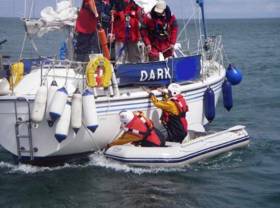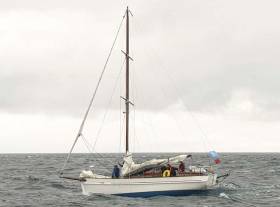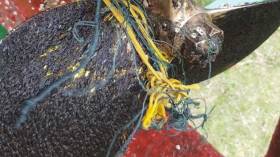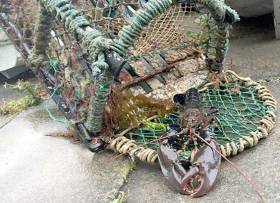Displaying items by tag: Lobster Pot
Fishing Gear Entanglement: Lobster Pot Controls For Scottish Waters
Hello and welcome to the weekly MacSweeney Podcast …
There is no national listing that I can find of the number of incidents in which leisure craft have become entangled in fishing gear in Irish waters.
When it happens, this is dangerous, often restricting steerage if the rudder is trapped and engine power when a propeller is affected.
The need for fishermen to mark the positions of their pots used for fishing lobster, crab or other fish or shellfish is understood. However, entanglement of leisure craft is a safety issue.
"Scottish maritime authorities intend to deal with it in a strong manner"
Scottish maritime authorities intend to deal with it in a strong manner, with new legislation to control potting to be introduced from next Spring.
It will ban the use of anything except regulated and marked fishing within 12 nautical miles of Scottish baselines from next Spring. This means, it says, “no plastic containers, empty fuel containers or even plastic milk bottles.”
These have been used in Irish waters. There have been several RNLI lifeboat call-outs to help free leisure craft entangled in pots. The only action taken about safety concerns in Ireland has been a “reminder” issued last year by the Department of Transport about their “obligation” to other users of the sea.
Listen to the podcast below for more details about what is being done to control the dangers caused by badly marked pots in Scotland. Then vote in our reader poll below and give your view on Lobster Pot control
- Votes: (0%)
- Votes: (0%)


Castletownbere RNLI lifeboat was tasked this morning (Wednesday 13 June) at 5.22am by the Valentia Coast Guard to go to the assistance of a 32 foot Belfast-registered yacht which had its propeller snagged in lobster pots near Dursey Island in County Cork.
The lifeboat Annette Hutton, under command of Coxswain Dave Fenton, was launched within minutes. Forty minutes later, the yacht, with five people on board, was located in a one-metre swell and Force 4 south-westerly winds near Dursey Island.
Lifeboat crew were able to successfully release the disabled yacht which is currently heading for Castletownbere. Castletownbere RNLI Lifeboat Operations Manager, Paul Stevens, commented: ‘This was a straightforward rescue. The crew of the yacht were prudent to call the emergency services when they did. With worsening weather conditions later today, had they not made the call, the outcome could have been very different’.
New Video Highlights Cruising Association Lobster Pots Campaign
The Cruising Association (CA) has just released a video highlighting the dangers of entanglement with lobster pots as part of its campaign for better marking of static fishing gear.
Afloat.ie has previously highlighted the perils of unmarked pots. On March 16 last year, the Irish government reminded lobster pot fishermen of their obligation to other 'Users of the Sea'.
In one year alone the RNLI has dealt with 295 incidents of fouled propellers. Many incidents go unreported, as shown by the tales of close encounters that have poured in to the Cruising Association (CA) during 2017, possibly a fraction of the actual number.
Introduced by Tom Cunliffe, the new CA video features two experienced yachtsmen describing their frightening encounters: Norman Kean whilst researching updates for Irish pilot books and Steve Williams whilst racing off Anglesey.
The campaign has clearly hit a nerve with the boating public. The CA has received an enormous response from people around the UK and worldwide telling of their experiences with unmarked pots and static fishing gear. More than 6,000 people have signed a petition posted by the CA on the government website calling for consultation with all interested parties on how to address this hazard and make navigation safer for everyone on the water.
The petition is still live and will remain so until the closing date of 12th March.
The CA feels that it is time for everybody with an interest in boating to work together to find a solution, particularly one that is affordable and practical for our fishermen.
See the petition here
Poorly marked lobster pots and fishing gear are the most difficult and unpredictable hazards facing the coastal cruising fraternity. Fishermen too report the loss of expensive gear as a result of entanglements. These encounters can even be life-threatening.
The CA hopes to secure a government consultation about the effectiveness of the current guidance and the merits of enforceable regulations for the whole of the UK
The Department of Transport, Tourism and Sport has received reports of vessels’ propellers becoming entangled in ropes of Marker Buoys used to indicate the position of pots used for fishing Lobster, Crab, or other fish or shellfish. This can occur because the length of rope used to fix Marker Buoys is too long, resulting in the line floating on or just below the surface.
The use of too long a line of rope can result in a situation where even vessels that have taken a wide berth around Marker Buoys could have their propellers fouled by the rope.
In addition, concerns have been raised that unsuitable ‘floats’ (e.g. empty drink cans, plastic bottles, dark-coloured floats, etc.) are being used that offer poor visibility or could be mistaken for floating debris.
Fishers who carry out pot fishing (whether commercially or non-commercially) are reminded of their obligation to other users of the sea.
Furthermore, non-commercial pot fishers are reminded of the regulations recently made by the Department of Agriculture, Food and the Marine covering such activity (S.I. No. 31 of 2016 Non-Commercial Pot Fishing (Lobster and Crab) Regulations 2016) which inter alia limits the numbers of pots permitted per boat to a maximum of six, and such pot fishing to the months of May to September.
Any mariners who spot any Marker Buoys/Ropes (or any other object) in the water which is deemed to represent a danger to navigation should communicate information on same to other vessels in the area and to the Irish Coast Guard, or to the local competent authority so that a hazard warning can be issued if appropriate, and any required follow-up action can be taken.

































































